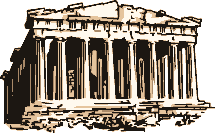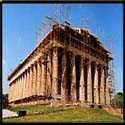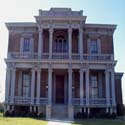
Nashville, Tennessee

S outhern
hospitality and culture go hand-in-hand with the city of Nashville. A
life-size replica of the Greek Parthenon of Athens
was constructed for
the state's celebration of 100 years of statehood. The
1896 Centennial Exposition, bankrolled by the Railroad, was
intended to promote Nashville's
industry and cultural recovery from the Civil War. The event
lasted for six months attracting nearly two million visitors to
Nashville to see the glory and
marvels of the city including the papier-mâché
versions of the popular Greek Temple and Pyramid.
outhern
hospitality and culture go hand-in-hand with the city of Nashville. A
life-size replica of the Greek Parthenon of Athens
was constructed for
the state's celebration of 100 years of statehood. The
1896 Centennial Exposition, bankrolled by the Railroad, was
intended to promote Nashville's
industry and cultural recovery from the Civil War. The event
lasted for six months attracting nearly two million visitors to
Nashville to see the glory and
marvels of the city including the papier-mâché
versions of the popular Greek Temple and Pyramid.  The
Parthenon
was such a success and glory to Nashville that it was left standing
after the Exposition. By 1920, the original structure had
deteriorated beyond repair, so a decision was made to attempt an
authenic and lasting concrete
reproduction. Eleven years was spent on that project. In
1988, The Parthenon was reopened after another two
year renovation at a cost of two million dollars by Nashville
architect Russell E. Hart, local Nashville architect, and William B.
Dinsmoor, New York architect and archaeologist, who studied the
ancient Greece ruins to draw up their blueprints. Currently underway
is another twelve million dollar renovation.
The
Parthenon
was such a success and glory to Nashville that it was left standing
after the Exposition. By 1920, the original structure had
deteriorated beyond repair, so a decision was made to attempt an
authenic and lasting concrete
reproduction. Eleven years was spent on that project. In
1988, The Parthenon was reopened after another two
year renovation at a cost of two million dollars by Nashville
architect Russell E. Hart, local Nashville architect, and William B.
Dinsmoor, New York architect and archaeologist, who studied the
ancient Greece ruins to draw up their blueprints. Currently underway
is another twelve million dollar renovation.
Encircling the
Parthenon are 46 Doric columns. Two
pairs of bronze doors, the largest in the world, weighing 7.5
tons each open onto floors composed of Tennessee marble and ceilings
of cypress from the Florida Everglades. Ivory and gold Athena, 42
feet high in her warrior armor stands majestically inside the
impressive temple. Crafted by Nashville sculptor, Alan LeQuire, the
"goddess of wisdom" is the
largest indoor statue in the western world. The tour of the
galleries of portraits and sculptures given by guides well-versed in
Greek mythology enhances appreciation for this sophisticated
monument. Inside Centennial Park.
In 1993, the Parthenon was
the inspiration for the Panathenaia Festival. The celebration was
modeled after ancient Greek athletic competitive olympics, which were
played entirely in the nude. Officials wanted to replicate
authenticity as much as possible, but balked at totally naked
participants. Settling for for Greek loincloths, called "perizomai",
the men were rubbed with olive oil and dusted with red clay. White
clay was used for the women. The games, held at the Tennessee State
University, consisted of a foot race, javelin throw, discus throw,
long jump and wrestling.  Belmont
Mansion, completed in 1853, was the summer
plantation home of thrice married Adelicia Hayes. The 36 rooms
(and there were no bathrooms) of this terra-cotta
Italianate villa were decorated with original and period
furnishings, art work and marble statues by American artists. The
ornamented elaborate gardens contained a water tower for irrigation,
green house, cast iron gazebos, bowling alley, bear house, monkeys,
aviary and a lake stocked with alligators. Adelicia generously opened
the grounds to the public as a park and zoo. Adelicia Hayes Franklin
Acklen Cheatham with her extensive land holdings in several states
was considered one of the richest women in America of the era. She
often hosted moonlight parties at the Mansion to take advantage of
the cool nights with the extravagant luxury of ice cubes being served
with water by the many slaves. During the Civil War, Adelicia
traveled to Louisiana and singlehandedly negotiated the illegal sale
of her cotton to England thus protecting her fortune. She was
entertained in European royal courts. Today Belmont Mansion is part
of a college campus owned by the Tennessee Baptist Convention. 1900
Belmont Blvd.
Belmont
Mansion, completed in 1853, was the summer
plantation home of thrice married Adelicia Hayes. The 36 rooms
(and there were no bathrooms) of this terra-cotta
Italianate villa were decorated with original and period
furnishings, art work and marble statues by American artists. The
ornamented elaborate gardens contained a water tower for irrigation,
green house, cast iron gazebos, bowling alley, bear house, monkeys,
aviary and a lake stocked with alligators. Adelicia generously opened
the grounds to the public as a park and zoo. Adelicia Hayes Franklin
Acklen Cheatham with her extensive land holdings in several states
was considered one of the richest women in America of the era. She
often hosted moonlight parties at the Mansion to take advantage of
the cool nights with the extravagant luxury of ice cubes being served
with water by the many slaves. During the Civil War, Adelicia
traveled to Louisiana and singlehandedly negotiated the illegal sale
of her cotton to England thus protecting her fortune. She was
entertained in European royal courts. Today Belmont Mansion is part
of a college campus owned by the Tennessee Baptist Convention. 1900
Belmont Blvd.
Clover Bottom Mansion in Donelson was built in
1858. This Italianate house is being utilized as the offices of the
Tennessee Historical Commission at 294 Lebanon Road.  An
ideal example of a stately
antebellum colonial home of a bygone era is the 28 room Two
Rivers Mansion. The estate derived it's name because it is
located between a junction of the Cumberland and Stones rivers. In
1859, David McGavock built this early Italianate style house on land
inherited by his wife, Willie, from her father, William Harding. Two
Rivers Mansion is available to rent for social affairs, and is booked
frequently for weddings and receptions. 3130 McGavock Pike.
An
ideal example of a stately
antebellum colonial home of a bygone era is the 28 room Two
Rivers Mansion. The estate derived it's name because it is
located between a junction of the Cumberland and Stones rivers. In
1859, David McGavock built this early Italianate style house on land
inherited by his wife, Willie, from her father, William Harding. Two
Rivers Mansion is available to rent for social affairs, and is booked
frequently for weddings and receptions. 3130 McGavock Pike.
Opryland's opulent 2,883-room Hotel has gorgeous outdoor
gardens and three different inside gardens. are absolutely
breathtaking. The two acre Conservator has thousands of tropical
plants, paved walkways, streams, and statues. The Cascades centers
around a dancing water fountain, the scene for elaborate laser and
music productions. It has waterfalls splashing down a manmade
mountain into a 12,500 square-foot lake. The Delta covers 4.5 acres
and features a fountain jetting water 85 feet high, it's own river
with passenger-carrying boats, food court, numerous shops and
Beauregard's Restaurant. I used to visit the atrium frequently for
the music, bars and fine dining, or to relax warm and cozy in front
of a fireplace in the lobby, until the visitor parking got so
expensive. During the Christmas holidays, the entire huge Opryland
complex sparkles with more than two million lights. Imagine that
electric bill! People drive from miles away causing traffic jams just
to see it.
Art lovers will find an abudance of paintings,
sculptures and other artwork in a variety of Nashville galleries.
John F. Kennedy
Center is unique in displaying artwork of children and adults
with disabilities. Vanderbilt Fine Arts Gallery presents five
exhibitions per year from more than 40 countries and cultures.
Sarratt Gallery, also at Vanderbilt, features ten exhibits each year
from regional and national artists.
Van Vechten Gallery at
Fisk, originally a gymnasium built in 1888, has been renovated to
house more than 100 works from the Alfred Stieglitz Collection
including pieces by Picasso, Cezanne, and Renoir plus American
masters, Marsden Hartley and Georgia O'Keeffe. Aaron Douglas Gallery
at Fisk University has free admission to displays of African Art, a
collection of masks, musical instruments, games, figures and
ceremonial objects plus more than 200 drawings by Cyrus Baldridge.
18th Avenue North and Jackson St.
A new $45 million fine arts
center will will be replacing the large downtown Post Office building
to display works by Van Gogh, Monet, Renoir and other European
masters.
The Nashville Chamber
Orchestra presents six high quality musical performances in
Nashville each season, and other concerts in nearby
communities.
Tennessee Performing Arts Center at 505 Deaderick
Street, "TPAC",
is the first state funded facility of its type in the United States.
Jackson Hall, the largest of three stages, seats 2,442 people. The
center provides the setting for The Nashville Symphony
Orchestra, Broadway musicals, Nashville Opera and concerts. Polk
Theater boasts performances by Tennessee
Repertory Theater, Johnson Theater and the Circle Players,
Nashville's oldest community acting group. Nashville
Ballet presents four dance programs from classical to jazz
annually with The Nutcracker performed every year. The Sunday
matinees are signed for the hearing impaired.
The three Arts
& Crafts Heritage Trails include an impressive long list of
cultural sights and attractions arranged by geographical areas, west,
middle
and east.
Cumberland
Science Museum has both hands-on activities, permanent and
changing displays, live demonstrations, animal shows. Some of the
past themes have been Dinosaurs, Star Trek, and The Beat Goes On. It
is a place that both children and adults will enjoy. The museum
includes Sudekum Planetarium where you can see laser shows featuring
our stars, constellations, moons and planets. 800 Fort Negley
Blvd.
The Hartzler-Towner Multicultural Museum, on the second
floor at the Scarritt-Bennett Center, features permanent and
temporary exhibits of over 4,000 cultural items from around the world
with an emphasis on Africa and Asia. The museum also has a collection
of 700 international dolls.
The Toy
Museum spans 150 years of toys. The exhibits include a model
trains running through giant layouts around the store, antique dolls,
wind-up train, early European bears, giant model ships, historical
planes and hundreds of lead soldiers on parade in battle
dioramas.
The Museum of Beverage Containers and Advertising is
an overwhelming hodge podge of more than 30,000 different beer and
soda cans, thousands of antique soda bottles and antique
advertisements. It is located in Millersville, just off I-65 about
ten minutes from Rivergate Mall. Admission is free.
The
Tennessee State Museum located in the basement of the Performing Arts
Center downtown traces state and country history from prehistoric
Indians to Civil War to the early 1900s. There is a rifle that
belonged to Daniel Boone, a powder horn from Davy Crockett and items
from both Andrew Jackson and James K. Polk. There are exhibits of
local-made quilts, pottery, paintings along with silver, weapons,
antebellum and Civil War artifacts. Reproductions of a log cabin,
tobacco barn, woodworking shop, parlor, print shop and an exact
replica of a grist mill from the 1800's are on display. 505 Deaderick
Street
The Military History Branch located in the War
Memorial Building, primarily focused on America's involvement in
foreign wars from the Spanish American War to World War II, is a
memorial to veterans. It has displays of weapons, battle histories
and military clothes including hero, Sgt. Alvin York's uniform.
Admission is free.
HoneyHoney's
Country Girl Hullaballo
http://www.geocities.com/bornhoney/
![]()